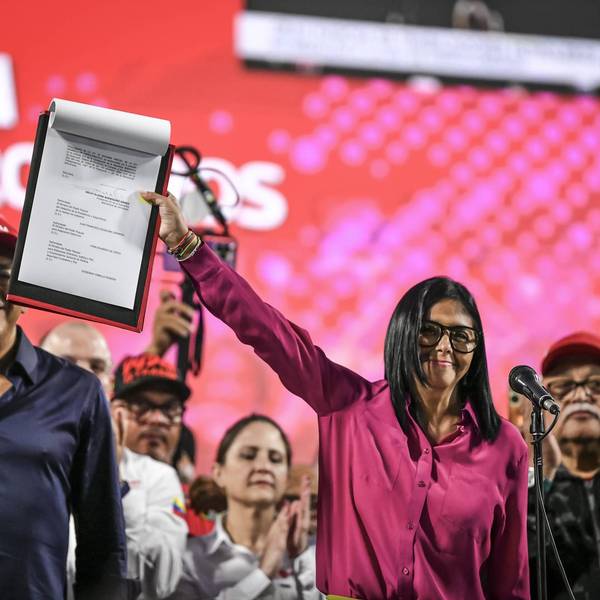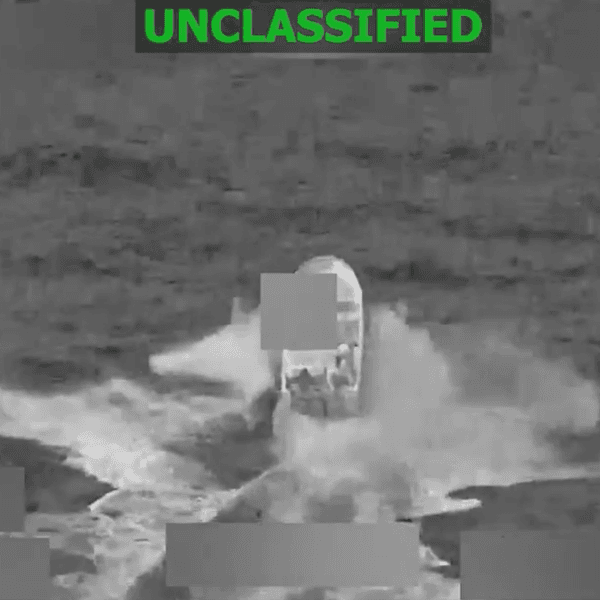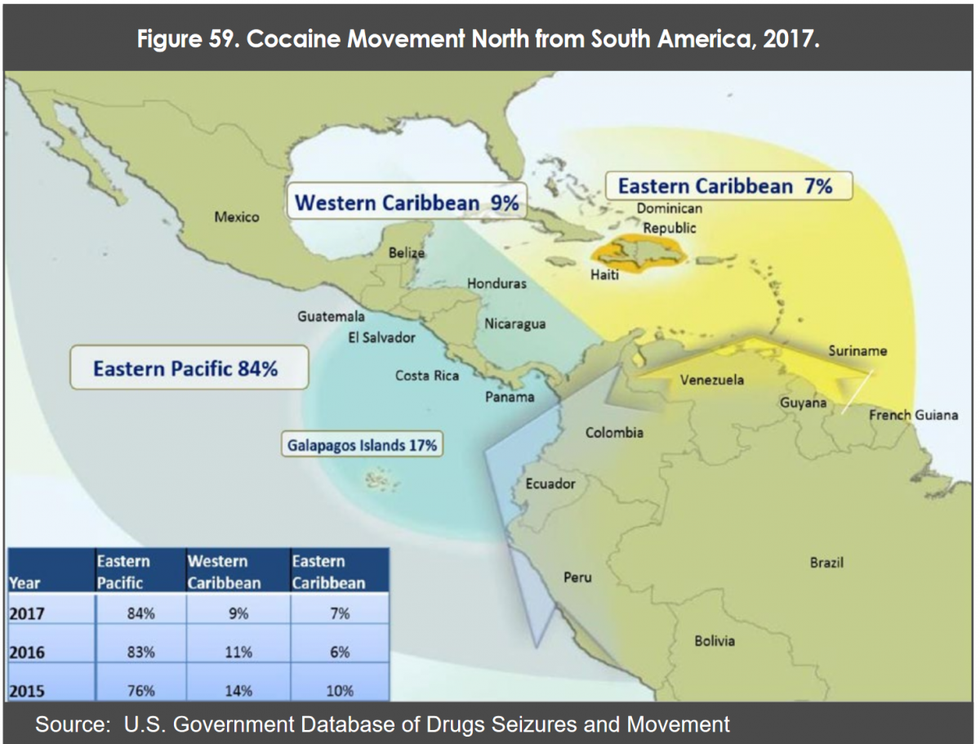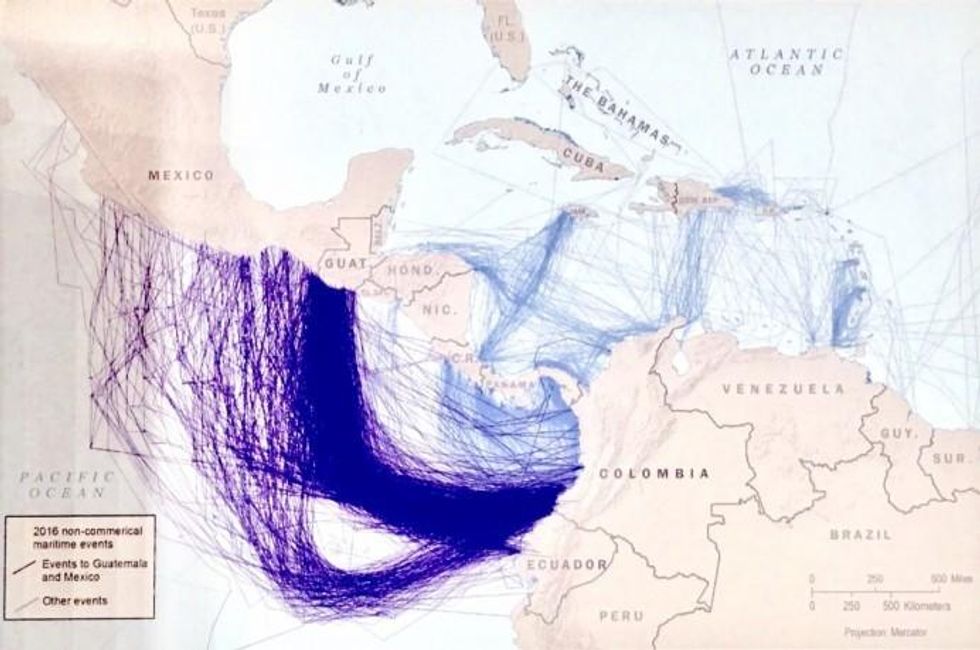For twenty years, right wing extremists in Miami and Washington have been slandering the Venezuelan government, accusing it of drug trafficking and harboring terrorists without ever offering even a shred of evidence. They finally got their wish on Thursday, when the U.S. Department of Justice unveiled indictments against President Nicolas Maduro and 13 other current or former members of Venezuela's government and military. In addition to the indictments, Attorney General William Barr offered a $15 million reward for information leading to the arrest or conviction of Maduro, as well as $10 million rewards for Diosdado Cabello (president of Venezuela's National Constituent Assembly), Tarek El Aissami (vice president for the economy), Hugo Carvajal (former director of military intelligence) and Cliver Alcala (retired general).
The indictment has backfired already. Hours after the announcement, Alcala posted videos online that threaten to cause further splits in the opposition and could result in the arrest of Juan Guaido. Before going into those details, however, it's important to understand just how politically biased the charges are against Maduro et al.
The myth that
Venezuela is a narco-state has already been debunked by the
Washington Office in Latin America, a think tank in Washington that supports regime change, as well as by
FAIR,
15 y Ultimo,
Mision Verdad,
Venezuelanalysis and others. It cannot be denied that Venezuela is a transit country for cocaine, but as the maps above and below show, less than 7% of total drug movement from South America transits from Venezuela (the Eastern Caribbean region includes Colombia's Guajira Peninsula). These maps,
produced by the Drug Enforcement Agency and
U.S. Southern Command, respectively, immediately raise questions as to why Venezuela is the country being targeted.
Of course, the charges have nothing to do with the drug
trade; they are the latest escalation in the Trump administration's "
maximum pressure March." The pretext is an alleged plot by the Venezuelan government to flood the United States with "
somewhere between 200-250 metric tons of cocaine." Although that figure might seem high, it's important to understand the context. The United States is the
world's biggest consumer of cocaine and Colombia is the world's biggest producer. On the other hand, Venezuela
does not cultivate coca, does not produce cocaine and, according to the U.S. government's own figures, less than 10% of global cocaine traffic transits through the country.
For the sake of comparison, the U.S. agencies that provided Barr with the figure of "200-250 tons" also say that an average of nearly 2,400 tons of cocaine flowed through Colombia between 2016 and 2019 (Venezuela averaged 216 tons - ten times less - in the same period). Colombia's current president, Ivan Duque, is a close ally of the country's former president, Alvaro Uribe, who himself has been linked to drug trafficking. Almost exactly a year ago, President Trump complained that "more drugs are coming out of Colombia right now than before" Duque was president, yet the U.S. continues giving millions in security aid to Colombia as part of its failed war on drugs.
The U.S double standard about narco-states is not limited to Colombia. Honduras's U.S.-backed president, Juan Orlando Hernandez, was linked to drug trafficking in a U.S. court, yet this news did not warrant a major announcement by the DOJ, presumably because Hernandez is a U.S. ally. Another U.S. ally, Guatemala, had six times as much cocaine flow through its territory as Venezuela.
The indictments are another brick in the foundation for a pretext for either a direct U.S. military invasion or a proxy war using Colombian forces. There are obvious comparisons to 1989, when the U.S. put a $1 million bounty on Panamanian president Manuel Noriega, only to subsequently invade the country, causing an estimated 4,000 deaths. The rewards the U.S. is offering for Maduro and four others are also troubling, as they have already been compared to a bounty. Maduro has already survived at least one assassination attempt (in August 2018 when drones laden with explosives detonated prematurely), and the rewards could be interpreted as, at minimum, a "get out of jail free" card should someone succeed in murdering him. On the other hand, the rewards verify what the Venezuelan government has been saying all along: the U.S. is offering millions of dollars for people to turn on the country's leadership.
Yet the Trump administration appears to have made a serious miscalculation by including the retired General Alcala in the indictments. A former ally of ex-president Hugo Chavez, Alcala joined the opposition in 2015 and has been linked to various coup plots and planned terror attacks since 2016. He is the highest profile former officer to turn against Maduro and is considered the "leader of pro-Guaido military personnel." Alcala is now wanted both by the United States and by Venezuela.
Alcala is implicated in a recent plot to attack the Maduro government. On March 24, Colombian authorities seized a truck full of weapons and military equipment, including 26 assault rifles, worth $500,000. Venezuelan intelligence services linked the weapons to three camps in Colombia where paramilitary groups of Venezuelan deserters and U.S. mercenaries are training to carry out attacks against Venezuela. According to Venezuela's Communication Minister Jorge Rodriguez, these groups were planning to take advantage of the COVID-19 pandemic to attack military units and plant bombs. He also linked the groups to Alcala.
These allegations proved to be correct, as Alcala, in a video he posted online hours after the indictments, admitted that the weapons were under his command. He further admitted that the weapons were purchased with funds given to him by Juan Guaido, with whom he allegedly signed a contract. Additionally, Alcala claimed that the operation was planned by U.S. advisors, with whom he supposedly met at least seven times. Aclala also alleged that Leopoldo Lopez, the founder of Guaido's party Voluntad Popular who was sprung from house arrest during Guaido's April 30 attempted insurrection, had full knowledge of the terror plot.
As a result of these videos, Venezuela's Attorney General has opened an investigation into Juan Guaido for an attempted coup. Despite Guaido's self-proclamation as president in January 2019, his attempted insurrection in April 2019, his repeated calls for sanctions and a military invasion, Venezuelan authorities had refrained from moving against him. The U.S. indictments appear to have caused the Venezuelan government to issue its strongest response to the Trump administration's and Guaido's continued provocations.
Of course, if the Trump administration were truly serious about combating terror, corruption and drug trafficking, the first Venezuelan they should look at ought to be Juan Guaido. After all, he was photographed with members of the infamous Los Rastrojos drug cartel, who allegedly helped him cross into Colombia in exchange for his turning a blind eye to the cartel's expansion from Colombia into western Venezuela. Guaido's team in Colombia embezzled humanitarian aid funds and now he has been directly implicated in a terror plot, one which presumably used money given to him by the United States (as that is his only source of financing).
The revelations about Guaido's spending of U.S. funds to buy weapons and his alleged involvement in yet another violent plot are putting pressure on opposition figures and parties that have hinted at wanting to participate in this year's legislative elections but have yet to fully commit to dialogue. A day before the U.S. indictments were revealed, President Maduro invited several of these leaders to join a dialogue in the Apostolic Nuncio (the Vatican's embassy in Caracas) in order to try to reach consensus over the nation's response to COVID-19. Now they are faced with the difficult choice of either angering Venezuelan voters (83% of whom reject a military option) by continuing to support Guaido's violence or angering the United States by working with indicted government officials.
The Trump administration has been sabotaging a negotiated solution to Venezuela's problems for two years, including in February 2018, when it threatened an oil embargo and support for a coup during negotiations between the government and the opposition in the Dominican Republic, and again in August 2019, when it imposed a full embargo during another attempt at dialogue. These new indictments, which even the New York Times described as "highly unusual", seemed timed to sabotage negotiations once again, as earlier in the week members of the moderate opposition, including National Assembly president Luis Parra, had recently urged the U.S. to lift the sanctions due to the coronavirus pandemic.
Yet another blunder with the indictments is that the Trump administration is sending contradictory messages. On the one hand, they have spent three years urging high level Venezuelan government and military officials to defect, promising space to operate politically after a transition government comes into power. On the other, they indicted the most high-profile member of the military who has defected, Cliver Alcala, on serious charges of narcoterrorism.
The brazenness of the indictments in attempting to cast Venezuela as a narco-state, the lack of foresight regarding possible repercussions, the attempted sabotage of dialogue and the mixed messaging are all signals that the Trump administration is desperate to ensure its regime change policy shows results. The victims of this policy are the Venezuelan people, who would be much better off with a policy of de-escalation, dialogue and a removal of the deadly sanctions.






